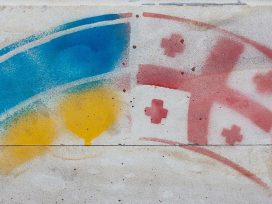On 29 November 2009 the Swiss electorate was called upon to vote on an initiative that wanted to ban, with immediate effect, the construction of minarets. Moreover, it was proposed that the ban – a mere detail of building law – be written into the constitution (!). What barely anyone thought possible then happened: the 57 per cent of citizens that took part in the referendum voted in favour of the ban (the turn-out was 53.4 per cent of all those eligible to vote). The double majority, that of the 26 cantons, was also easily reached. Only the three French-speaking cantons – Geneva, Vaud and Neuchâtel – along with Basel, the only cosmopolitan city in German-speaking Switzerland, voted no.
The entire Swiss elite, up in arms about the “PR disaster”, insinuated that the decision was without precedent; yet this was to obscure the true background. Although the supposedly “civil” citizens did indeed opt for a highly sovereign self-defeat, it was according to the motto: “What’s good enough for those up top is good enough for those down below”.
Over the course of many years, the Swiss political and economic elites have been undermining their own “civility” with their struggle to retain banking secrecy on behalf of tax evaders of all calibre. It began already in the mid-1990s, with the “orphaned” Jewish accounts in Swiss banks. Only after pressure from the US administration and Jewish interest groups was it possible to persuade the Swiss elites that this murky past finally needed to be investigated. That then happened with a 40-strong commission led by the Swiss historian Jean-François Bergier, which published its findings in 2002 (supplemented by over two dozen special reports). Flying in the face of national lies and the sophistries of school history lessons, the Bergier commission made it clear that in the Second World War the Swiss elites did have room to manoeuvre, which in some areas – for example in business – they took full advantage of, but which in refugee policy they quite consciously did not.
In 1997, after a report about dormant bank accounts in Switzerland, the Holocaust Fund was set up, furnished by Swiss banks and the National Bank with 100 million franks each, and by the business sector with 73 million franks. 309 000 living victims, above all in eastern Europe, Belarus and the Ukraine, received payments from the funds.
However anyone who might have supposed that the Swiss elites were any the wiser after their image had been damaged thus, soon realized their mistake. When, two years ago, the US and the EU began investigating tax evasion more closely, they came across the same old stubbornness from Swiss banks and authorities, which wanted to retain the fine difference between tax evasion punishable by a fine and that punishable by a prison sentence, so as to protect their dubious customers worldwide. In short: with so much slyness among those up top, the resentments of those down below should come as no surprise.
Alpine chauvinism
 Of course, the referendum was not about minarets, of which there are a grand total of four in Switzerland. The campaign rode on the back of antipathies towards Muslims and Islam, mobilizing the old Alpine chauvinism against foreigners in the context of the economic crisis and rising unemployment. The campaign, designed by the German “creative” (adman, in other words) Alexander Segert, had clear racist features, especially one poster which shows a woman in a burqa standing next to seven minarets, sprouting out of a Swiss flag like rockets that are apparently threatening the country.
Of course, the referendum was not about minarets, of which there are a grand total of four in Switzerland. The campaign rode on the back of antipathies towards Muslims and Islam, mobilizing the old Alpine chauvinism against foreigners in the context of the economic crisis and rising unemployment. The campaign, designed by the German “creative” (adman, in other words) Alexander Segert, had clear racist features, especially one poster which shows a woman in a burqa standing next to seven minarets, sprouting out of a Swiss flag like rockets that are apparently threatening the country.
Apart from Swiss People’s Party (SVP), led by Christoph Blocher, and a couple of far-Right sects, all parties, all churches, and all trade unions and business associations were against the ban. Hence the result of the referendum is indeed a sensation. The defeat is particularly embarrassing for the parliament, which rejected the initiative with a 70 per cent majority, yet agreed to the referendum result despite the minaret ban being in clear breach of the constitutional guarantee of religious freedom and ban on discrimination. Not legally necessary, this parliamentary agreement was the result of pure opportunism, as well as a fear of ruling an SVP initiative to be unconstitutional. Because in Switzerland there is, for logical-systematic reasons, no constitutional court – in a direct democracy, the people have the last word – the decision will now be made by the European Court of Human Rights in Strasbourg.
Joining the celebrations of the self-righteous Swiss chauvinists in their victory over reason and tolerance is a pan-European, international radical rightwing party with branches in, among other countries, Austria, Italy, France and the Netherlands. Roberto Calderoni, a Northern League MP in the Berlusconi government, immediately announced what was on the rightwing agenda in Italy: “Yes to church steeples, no to minarets.” Similar sentiments come from the FPÖ and BZÖ in Austria, who both demand a Europe-wide ban. In the Netherlands, Geert Wilders, leader of the “Party for Freedom”, announced that the Dutch would also have the opportunity to vote on a minaret ban. Buoyed by this success, the Swiss initiators declared there would also be referenda on “arranged marriage”, “honour killings”, and “burqas” – in short, the complete programme of popular Islam-baiting, which is also on the increase in Germany.
Demonstrations in Zürich and Bern of several hundred, mostly young people with banners such as “Embarrassed to be Swiss” are small comfort compared to the fact that in 15 cantons between 60 and 71 per cent voted for the ban. Adding to the miserable result, on the same day a motion to ban the export of military equipment was voted down by a majority of over two-thirds (in the small cantons the majority was as high as 77 to 88 per cent). At the same time, there is no fetish more vaunted than neutrality. The question of how this can be reconciled with arms trading plays no role in the bigoted majority media discourse. The internationally respected Neue Zürcher Zeitung promptly criticized the initiative as an attempt to partly “disarm” the weapons export industry.
European swing to the right
What, then, does the result of the minaret vote mean? First: even if the Frankfurter Allgemeine Zeitung comments that direct democracy and popular referenda automatically contain “a populist factor”, this fundamental critique remains fundamentally wrong. Populism is not built serially into direct democracy; rather, rightwing and far-right groups help themselves to the instruments of direct democracy (in ways thoroughly contrary to what they are intended for) for their own dim purposes. The legitimate entitlement of citizens to direct participation is not the quirk of a small alpine country, as maintained by many German intellectuals on both the Right and the Left, but rather the core demand of emancipatory citizenship. The North American colonies freed themselves from subservience to the British monarchy with the demand: “No taxation without participation”.
There are good historical reasons for the German constitution’s shortcomings in the question of direct participation, however no other reasons. When the constitution was first drafted, distrust of a people that for twelve years had almost unanimously followed a criminal leader was justified. Now, however, it has become outdated.
Second: the result of the Swiss referendum was indeed a surprise – all the prognoses were between 15 and 20 per cent off the mark and predicted a clear rejection of the initiative. In situations like this, opinion polls refer to the “fist in the pocket effect”, meaning that when asked, people do not express their real opinion because this is somehow considered “impolite” or “not the form”. This self-denial always points to a real problem behind the apparent one: while ostensibly about the risk of “Islamization” and “Islam”, beneath the surface is many citizens’ fear of social declassification, unemployment and poverty – problems to which the elites have no answer.
As a result of the economic crisis of 2009, Switzerland’s unemployment rate rose to around four per cent, having been more or less insignificant since 1945. The SVP were already talking of re-negotiating the treaty on the free movement of persons with the EU, in other words of swinging onto the “foreigners out” track. Ultimately, the result of the referendum is a sign of the general insecurity of many citizens, and above all an expression of the distance between them and the political and economic elites. This distance is the most telling indicator of the political class’s lack of legitimacy and – in the crisis – of the distrust towards the economically influential elites. However this applies across Europe. In view of this evidence, it is high time that the parties and the trade unions, those in government and those profiting, realize that it is in their own interests to involve the fears and insecurities of broad sections of the public in their political calculations, and act accordingly.
Third: domestically, the divide between the liberal, western Swiss cantons and the increasingly reactionary eastern cantons is increasing. This divide has existed since 1914, when Francophile and Germanophile politicians and militaries stood opposite one another. However it has never developed into a real threat to the unity of the country. The referenda of recent years, however, show that the divide is becoming ever wider. Switzerland is isolating itself in Europe, with this decision lowering the minimum civil standards of legality and tolerance. By entering a building law into its constitution, the country has made itself as ridiculous as when the white wine lobby constitutionalized a ban on Absinthe in 1908. It remained in force for 97 years and was only lifted in 2005. One does not need to be a prophet to forecast that the ban on minarets is unlikely to last that long. The predictable slap in the face from Strasbourg will ruin the image of the country completely.
Switzerland’s reputation as a free and democratic country is over, it seems. In the warmest November in living memory, winter descended in the Alps. In political terms, the Ice Age could last a long time for Swiss politics.

 Of course, the referendum was not about minarets, of which there are a grand total of four in Switzerland. The campaign rode on the back of antipathies towards Muslims and Islam, mobilizing the old Alpine chauvinism against foreigners in the context of the economic crisis and rising unemployment. The campaign, designed by the German “creative” (adman, in other words) Alexander Segert, had clear racist features, especially one poster which shows a woman in a burqa standing next to seven minarets, sprouting out of a Swiss flag like rockets that are apparently threatening the country.
Of course, the referendum was not about minarets, of which there are a grand total of four in Switzerland. The campaign rode on the back of antipathies towards Muslims and Islam, mobilizing the old Alpine chauvinism against foreigners in the context of the economic crisis and rising unemployment. The campaign, designed by the German “creative” (adman, in other words) Alexander Segert, had clear racist features, especially one poster which shows a woman in a burqa standing next to seven minarets, sprouting out of a Swiss flag like rockets that are apparently threatening the country.




